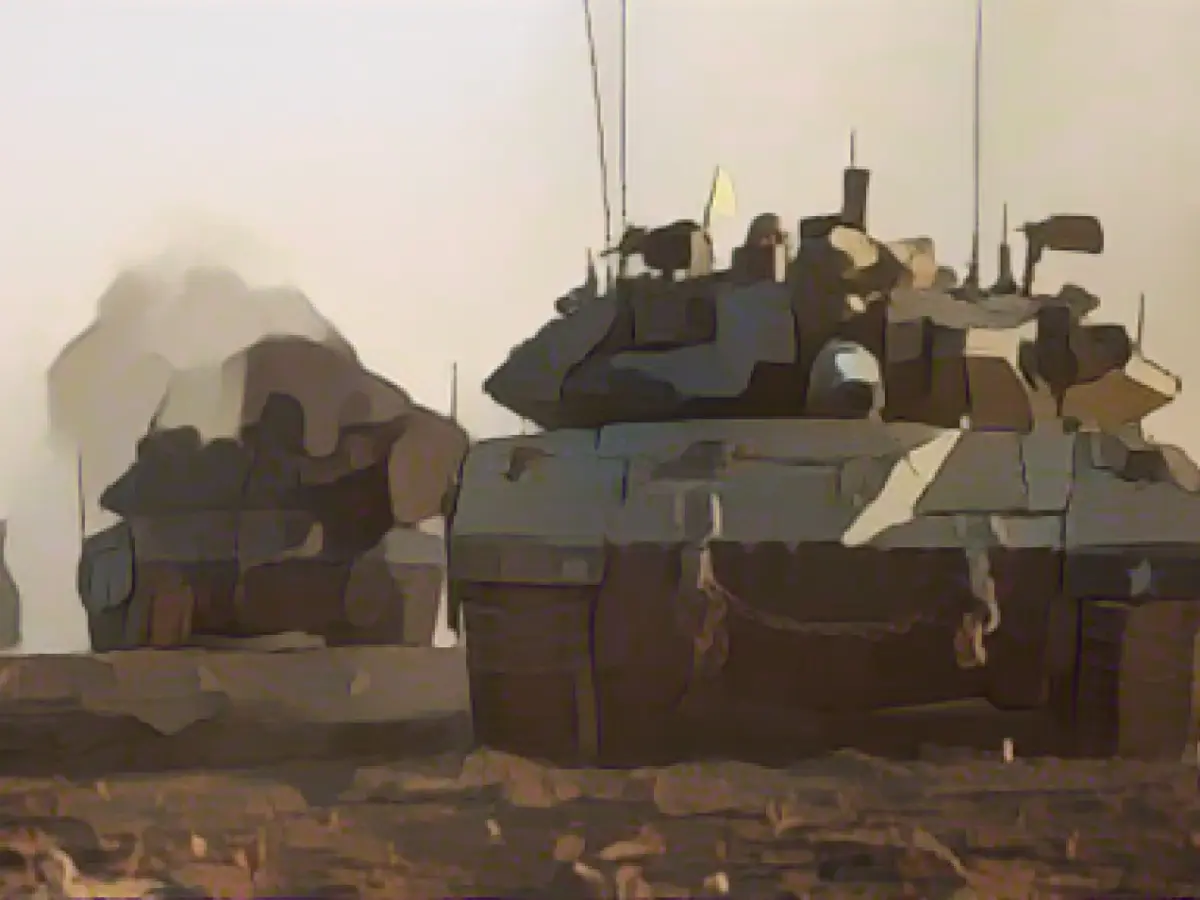Eyewitnesses: Israeli tanks enter the south of the Gaza Strip
The Israeli army announced on Monday that it was taking "aggressive" measures against "Hamas and other terrorist organizations" in the city of Khan Yunis in the southern Gaza Strip. As a result of the Israeli forces' advance, civilians are no longer able to travel on the Salaheddin Road to the north and east of Khan Yunis.
This important traffic axis connects the north and south of the Palestinian territory. The Salaheddin Road is a "battlefield" and it is "very dangerous to go there", warned the Israeli army.
Eyewitnesses told the AFP news agency that dozens of Israeli military vehicles had driven into the Gaza Strip at the height of Chan Junis. According to these reports, the Israeli tanks reached the Salaheddin Road.
"They are occupying the Salaheddin Road on both sides and are now cutting it off between Deir al-Balah (in the center of the Gaza Strip) and Khan Yunis," reported 34-year-old Moas Mohammed. The Israeli soldiers fired "bullets and tank shells at cars and people trying to move through the area".
For weeks, the Israeli attacks triggered by the Hamas attack on Israel on October 7 had concentrated on the north of the Gaza Strip. However, the south had also come under heavy fire at the weekend, including the area around Chan Junis.
In Berlin, a spokesperson for the Federal Foreign Office said that the expansion of the Israeli military operation to the southern Gaza Strip "naturally increases the risk of civilians coming to harm during military operations". It is "particularly important to the German government that Israel's actions take this into account and avoid civilian suffering".
The Israeli army had called on the civilian population to move to safe areas "if necessary". On Monday, it also affirmed that it did not want to expel the Palestinian civilian population from the Gaza Strip. "We are not trying to expel anyone," said army spokesman Jonathan Conricus.
Rather, the military had called on all civilians to withdraw from the combat zones - and had set up a "humanitarian zone within the Gaza Strip" specifically for this purpose. This is a small coastal area around the town of Al-Mawasi. The Israeli military is "well aware that space and access are limited", said Conricus.
According to estimates by the UN Office for the Coordination of Humanitarian Affairs (Ocha), the war has displaced around 1.8 million people in the Gaza Strip, around 75 percent of the population, many of whom have been living in overcrowded shelters ever since.
Israel also continued its attacks in the north of the Gaza Strip. On Monday night, an entrance to the Kamal Adwan hospital north of the city of Gaza was hit and several people were killed, according to the Palestinian news agency Wafa and Hamas.
The Israeli army did not initially respond to an AFP inquiry as to whether the hospital had been targeted. Israel accuses Hamas of having installed positions under hospitals.
A seven-day ceasefire expired on Friday, which had been used to release a total of 105 hostages from Hamas hands. At the same time, 240 Palestinian prisoners were released from Israeli prisons. According to Israeli information, Hamas still holds 137 hostages.
However, the Israeli authorities count not only the living as hostages, but also the dead whose bodies have not been handed over. On Monday, Israeli Prime Minister Benjamin Netanyahu announced that the bodies of 15 Israelis were in the Gaza Strip. They were eleven civilians and four soldiers.
The war between Israel and Hamas has now been going on for more than eight weeks. On 7 October, hundreds of fighters from Hamas, which is classified as a terrorist organization by the USA and the EU, invaded Israel and committed atrocities, mainly against civilians. According to Israeli reports, around 1,200 people were killed and around 240 people were taken hostage.
In response, Israel began massive attacks on targets in the Gaza Strip. According to the latest information from Hamas, which cannot be independently verified, almost 15,900 people have been killed in the Palestinian territory since then, most of them civilians.
dja/ju
Read also:
- The Federal Government in Berlin expressed concern over the Israeli army's expansion of its military operation into the southern Gaza Strip, stating it increases the risk of civilian harm.
- Eyewitnesses reported that Israeli tanks had entered the Gaza Strip, specifically the south, near Chan Junis, and were now occupying the Salaheddin Road.
- The Israeli army had previously focused on the northern part of the Gaza Strip, but the weekend saw heavy fire in the south, including the area around Chan Junis.
- According to Moas Mohammed, an eyewitness, Israeli tanks had reached the Salaheddin Road and were now cutting off access between Deir al-Balah and Khan Yunis.
- The Israeli army urged civilians to move to safe areas if necessary and established a humanitarian zone in the small coastal area around Al-Mawasi for this purpose.
- The UN estimates that around 1.8 million people have been displaced by the conflict in the Gaza Strip, with many living in overcrowded shelters since the start of the war.
- The Israeli military denied targeting the Kamal Adwan hospital north of Gaza City, although several people were reportedly killed when an entrance was hit on Monday night.
- Israel accuses Hamas of having installed positions under hospitals, with Prime Minister Benjamin Netanyahu stating that the bodies of 15 Israelis were still in the Gaza Strip.
- With the seven-day ceasefire expiring on Friday, over 105 hostages were released from Hamas hands and 240 Palestinians were freed from Israeli prisons.
- However, Hamas still holds 137 hostages, according to Israeli information, which also includes dead bodies whose remains have not been handed over.
- The conflict between Israel and Hamas has been ongoing for over eight weeks, with Hamas' attack on Israel on October 7 causing widespread destruction and civilian casualties.
Source: www.stern.de







